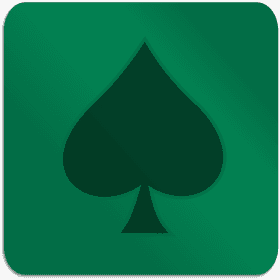Spades
 Spades se inventó en los Estados Unidos en la década de 1930 y se juega bastante en ese país. Hasta hace poco no se conocía mucho en otros lugares, excepto en algunos lugares donde estaban estacionadas las tropas estadounidenses; por ejemplo, en partes de Alemania.
Spades se inventó en los Estados Unidos en la década de 1930 y se juega bastante en ese país. Hasta hace poco no se conocía mucho en otros lugares, excepto en algunos lugares donde estaban estacionadas las tropas estadounidenses; por ejemplo, en partes de Alemania.
Spades es un juego de bazas simples donde las picas siempre ganan. Se suele jugar por equipos entre 4 jugadores.
Número de jugadores: 4
Duración de la partida: 33 mn
Complejidad: 2 / 5
Juega Spades y 1229 otros juegos en línea.
No es necesaria ninguna descarga - juega directamente desde tu navegador.
Con tus amigos y con miles de jugadores del mundo entero.
Libre.

Juega Spades y 1229 otros juegos en línea.
No es necesaria ninguna descarga - juega directamente desde tu navegador.
Con tus amigos y con miles de jugadores del mundo entero.
Libre.

Sumario de reglas
La baraja
Se utiliza la baraja estándar de 52 cartas.
Valor de los palos
El palo de picas siempre es triunfo.
Valor de las cartas
A (alta), K, Q, J, 10, 9, 8, 7, 6, 5, 4, 3, 2
Objetivo del juego
Ganar al menos el número de bazas apostado.
El reparto
El primer repartidor se elige por sorteo de la carta más alta, y a partir de entonces, el turno de repartir se desarrolla en el sentido de las agujas del reloj. Se reparte toda la baraja, una carta a la vez, boca abajo, comenzando por la izquierda del repartidor. Los jugadores recogen sus cartas y las ordenan por palos.
La puja
Cada jugador decide cuántas bazas cree que puede ganar. El jugador a la izquierda del repartidor comienza la puja y, por turnos, cada jugador indica cuántas bazas espera ganar. Solo hay una ronda de pujas, y la puja mínima es una. Cada jugador debe hacer una puja; ningún jugador puede pasar. No se menciona el palo en la puja, ya que, como indica el nombre del juego, las espadas siempre son triunfo.
El juego se puntúa por manos, y el ganador debe alcanzar una cierta cantidad de puntos, que se decide antes de comenzar. Quinientos puntos es lo habitual, pero 300 puntos es adecuado para una partida corta. El jugador a la izquierda del repartidor inicia la baza, y los jugadores deben seguir el palo, si es posible. Si un jugador no puede seguir el palo, puede jugar un triunfo o descartar. La baza la gana el jugador que juega el triunfo más alto o, si no se jugó ningún triunfo, el jugador que jugó la carta más alta del palo. El jugador que gana la baza inicia la siguiente. El juego continúa hasta que ningún jugador se quede sin cartas. Cada mano tiene 13 bazas. No se puede iniciar la baza con espadas a menos que se hayan jugado previamente o que el jugador no tenga nada más que espadas en su mano para iniciar.
Puntuación
Por cumplir el contrato (el número de bazas apostadas), el jugador obtiene 10 puntos por cada baza apostada, más 1 punto por cada baza extra.
Por ejemplo, si la apuesta del jugador es de siete bazas y gana siete, la puntuación sería de 70. Si la apuesta fue de cinco bazas y el jugador ganó ocho, la puntuación sería de 53 puntos: 50 puntos por la apuesta y 3 puntos por las tres bazas extra. En algunas variantes, las bazas extra se denominan "bolsas" y se deducen 100 puntos cada vez que un jugador acumula 10 bolsas. Por lo tanto, suele ser mejor cumplir la apuesta al pie de la letra.
Si un jugador incumple su contrato, es decir, si gana menos bazas de las que había apostado, se le restan 10 puntos por cada baza apostada. Por ejemplo, si un jugador apuesta cuatro bazas y solo gana tres, se le restan 40 puntos. Uno de los jugadores es el anotador y registra las apuestas para que, durante la partida y para el recuento posterior, todos los jugadores tengan acceso a esta información. Al finalizar una mano, las puntuaciones deben registrarse junto a las apuestas y se debe llevar un marcador acumulado para que los jugadores puedan ver fácilmente el total de puntos de los demás. En caso de empate, todos los jugadores participan en una ronda adicional.

